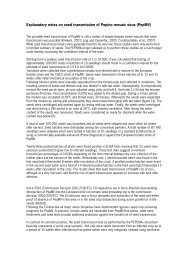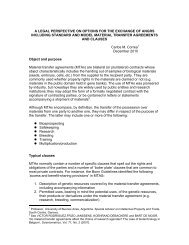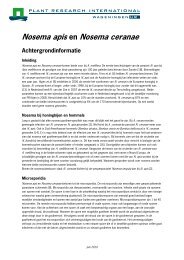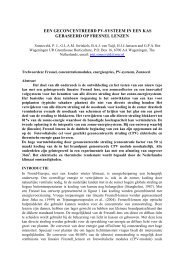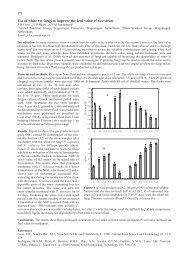Oil spill dispersant article
Oil spill dispersant article
Oil spill dispersant article
You also want an ePaper? Increase the reach of your titles
YUMPU automatically turns print PDFs into web optimized ePapers that Google loves.
CONCLUSIONS<br />
There is a great deal of scientific evidence to<br />
show that the use of <strong>dispersant</strong>s can be an<br />
effective oil <strong>spill</strong> response method. There is<br />
little likelihood of <strong>dispersant</strong> use causing negative<br />
effects unless they are used in shallow<br />
water or very close to particularly sensitive<br />
species. Even in cases when <strong>dispersant</strong>s might<br />
cause negative effects, the positive benefit<br />
obtained by their use might outweigh this to<br />
produce a Net Environmental Benefit. Nevertheless,<br />
any use of <strong>dispersant</strong>s must be carefully<br />
planned and explained to all those who<br />
might be affected by an oil <strong>spill</strong>.<br />
Some of the fears and concerns expressed<br />
about <strong>dispersant</strong> use are genuinely held, have<br />
their basis in fact and are rooted in an understandable<br />
concern for the marine environment.<br />
It is important that these concerns are<br />
addressed and that they are addressed openly<br />
and truthfully so that the real purpose of<br />
using <strong>dispersant</strong>s is clear to everyone. This<br />
can be diffi cult as some of the arguments<br />
are complex and not obvious; how can it<br />
be sensible to force oil into the sea when<br />
common-sense apparently says that picking it<br />
up is, by far, the best option Questions will<br />
be asked during and after oil <strong>spill</strong> response<br />
and it is much better if the discussion can<br />
take place in the calmer and less recriminating<br />
atmosphere, during oil <strong>spill</strong> contingency planning.<br />
Putting <strong>dispersant</strong> use in the<br />
context of other options<br />
People who are not directly involved in oil<br />
<strong>spill</strong> response rarely appreciate the immense<br />
practical diffi culties in responding to oil <strong>spill</strong>s.<br />
The failure to achieve a total solution with no<br />
environmental damage caused is seen as only<br />
as a partial success - a degree of failure by<br />
the responders is assumed. The reality is that<br />
achieving anything at all, in the face of prevailing<br />
conditions, may evade even the most dedicated<br />
and well-equipped responders. Dealing<br />
with the variations of weather and the sea<br />
can be unpredictable, even during routine procedures.<br />
Conducting an emergency response<br />
to an oil <strong>spill</strong> incident, in which rough weather<br />
or sea conditions is a contributory factor, is<br />
doubly difficult. It should be made clear to<br />
people that all oil <strong>spill</strong> response techniques<br />
have limitations<br />
Concerns over dispersed oil<br />
Dispersed oil does not cease to exist, even<br />
if it is no longer visible on the sea surface.<br />
The purpose of using <strong>dispersant</strong>s is to rapidly<br />
transfer oil from the sea surface into the sea,<br />
but this should not just be for the purpose of<br />
just making it disappear from sight. Concerns<br />
over dispersed oil should be addressed by<br />
pointing out that:<br />
• The initially high concentrations of dispersed<br />
oil and partially water-soluble oil<br />
components will be very rapidly diluted to<br />
concentrations below those that cause negative<br />
effects on a wide variety of marine<br />
life.<br />
• A lot of the <strong>spill</strong>ed oil that is dispersed<br />
will eventually be biodegraded over a period<br />
of weeks and months; it will therefore not<br />
persist indefi nitely in the marine environment.<br />
• Any oil that cannot be biodegraded will<br />
be of very low toxicity (the components<br />
are not bio-available, otherwise they would<br />
have been biodegraded) and will eventually<br />
join the seabed sediment, diluted with other<br />
detritus over a huge area, but at extremely<br />
low local concentrations.<br />
Identifying the real unknowns<br />
and the real potential risks<br />
The fear that insidious or ‘invisible’ effects<br />
may be occurring, or that the consequences of<br />
dispersing oil may only become apparent long<br />
after <strong>dispersant</strong>s have been used, is not an<br />
unreasonable concern. Fears that fi sh stocks,<br />
already under stress from over-fi shing and<br />
other forms of pollution, might be further<br />
adversely affected by dispersed oil in a possibly<br />
unknown way is also a reasonable concern<br />
- up to a point.<br />
26



